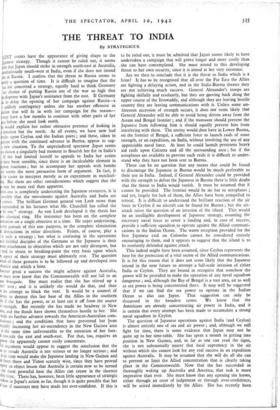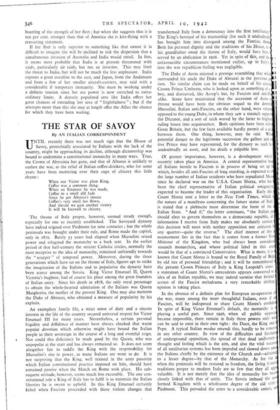THE THREAT TO INDIA
By STRATEGICUS
NT events have the appearance of giving shape to the apanese strategy. Though it cannot be ruled out, it seems 'lie that Japan should strike in strength south-east at Australia, ultaneously south-west at India, even if she does not intend at Russia. I confess that the threat to Russia seems to erely a question of time. It is difficult to imagine that the has not concerted a strategy, equally hard to think Germany her chance of putting Russia out of the war so high that dispense with Japan's assistance from the east. If Germany to delay the opening of her campaign against Russia—a unlikely contingency unless she has another offensive in ion that will fit in with her campaign for the season— may have a few months to continue with other parts of her ye before she need look north.
would explain her rather obtrusive pretence of looking in direction but the north. At all events, we have now had tacks upon Ceylon and the Indian ports ; and these, taken in ction with the continued advance in Burma, appear to sug- a new situation. To the unprejudiced spectator Japan seems ye chosen a singularly bad moment to flourish her fist in India's If she had limited herself to appeals to India her action have been sensible, since there is an incalculable element in uman reactions ; but to accompany her appeals with bombs ly seems the most persuasive form of argument. In fact, it be easier to interpret merely as an experiment in mischief- . But there are other considerations which suggest that the t may be more real than apparent.
Tess one is completely underrating the Japanese resources, it is possible that the -movements against Australia and India are serious. The brilliant German general von Leeb more than expounded in his lectures what Mr. Churchill has called the by one" strategy. As von Leeb developed it the thesis has e classical ring. His insistence has been on the complete ntration on a single objective at a time. He urges undeviating, stent pursuit of this one purpose, to the complete elimination distractions in other directions. Feints, of course, play a in such a strategy ; but what is confusing in the operations ch faithful disciples of the Germans as the Japanese is their uent attachment to objectives which are not only divergent, but tend to strain to breaking-point the very basis upon which ry aspect of their strategy must ultimately rest. The question which of these gestures is to be followed up and developed into densive and which a feint.
lowever great a success she might achieve against Australia, al must now know that the Commonwealth will not fall to an clue brusquie. She must realise that she has stirred up a [lets' nest ; and it is unlikely she would do that, and then m no attempt to block the vent. It would be a counsel of fence to destroy this last base of the Allies in the southern hc if she has the power, or at least cut it off from the source ts strength. But recently she has made no headway in New Ilea, and the floods have shown themselves hostile to her. She made no further advance towards the American-Australian com- acations ; and the conditions that have prevented her from rmably increasing her air-ascendency in the New Guinea area at the same time unfavourable to the extension of her foot- Is towards the east and south-east. For that, too,, requires an )0w. er she apparently cannot easily concentrate. in argument would appear to suggest the conclusion that the IC to invade Australia is not serious or no longer serious ; and La its turn would make the Japanese landing in New Guinea and k from there and Timor scarcely wise, since they have proved )gent an object lesson that Australia is certain now to be turned the most powerful base the Allies can create in the shortest Ible time. There has, however, been little appearance of strategic 'skin in Japan's action so far, though it is quite possible that her I run of successes may have made her over-confident. If this is
to be ruled out, it must be admitted that Japan seems likely to have undertaken a campaign that will prove longer and more costly than she can have contemplated. She must attend to this developing threat to her own security, since it is aimed at her very existence.
Are we then to conclude that it is the threat to India which is a feint? It has to be recognised that all over the Far East the Allies are fighting a delaying action, and in the India-Burma theatre they are not achieving much success. General Alexander's troops are fighting skilfully and resolutely, but they are moving back along the upper course of the Irrawaddy, and although they are leaving hostile country they are leaving communications with it. Unless some un- foreseen accession of strength occurs, it does not seem likely that General Alexander will be able to avoid being driven away from the Assam and Bengal frontier ; and if the monsoon should prevent the Japanese from following him it should equally prevent him from interfering with them. The enemy would then have in Lower Burma, on the frontier of Bengal, a sufficient force to launch raids of some strength, or an expedition, on India, without involving the use of any appreciable naval force. At least he could launch persistent heavy aid raids upon Calcutta and all the surrounding area ; for if the aeroplanes are available to prevent suc.fi raids it is difficult to under- stand why they have not been sent to Burma.
There can be no question that any means that could be found to discourage the Japanese in Burma would be much preferable to their usc in India. Indeed, if General Alexander could be provided with the strength to defeat the Japanese in Burma there is little doubt that the threat to India would vanish. It must be assumed that it cannot be provided. The frontier would be no bar to aeroplanes ; and yet, largely for lack of them, the Allies have been compelled to retreat. It is difficult to understand the brilliant reaction of the air force in Ceylon if no aircraft can be found for Burma ; but the air- attack raises the question of an invasion of the island. This would be an intelligible development of Japanese strategy, assuming the necessary naval force to cover a landing and, in case of success, provide a sufficient squadron to operate against the Allied communi- cations in the Indian Ocean. The warm reception provided for the first Japanese raid on Colombo cannot be considered entirely encouraging to them, and it appears to suggest that the island is to be resolutely defended against attack.
This indeed might have been assumed, since Ceylon represents the base for the protection of a vital sector of the Allied communications. It is for this reason that it does not seem likely that the Japanese intend in the near future to attempt a full-scale invasion of either India or Ceylon. They are bound to recognise that somehow the power will be provided to make the Operation of any naval squadron dangerous ; and, although the Bay of Bengal is a vast area, air as well as sea power is being concentrated there. It may well be suggested that if we can find the sea power to operate in the Indian Ocean so also can Japan. That suggestion can only be discussed in the broadest terms. We know that the Americans are already concentrating air power in India, and it is certain that every attempt has been made to accumulate a strong naval squadron in Ceylon.
The question of Japanese operations against India (and Ceylon) is almost entirely one of sea and air power ; and, although we still fight for time, there is some evidence that Japan may not be quite up to her time-table. She has spent a month in getting into position in New Guinea, and, so far as one can read the signs, she is not substantially nearer that local supremacy in the air without which she cannot look for any real success in an expedition against Australia. It may be assumed that she will do all she can to prevent or limit the Allied concentration that is dearly taking place in the Commonwealth. Now that she has succeeded in thoroughly waking up Australia and America, that task is more imperative than ever. She must know that any opening she leaves, either through an error of judgement or through over-confidence, will be seized immediately by the Allies. She has recently been
boasting of the strength of her fleet ; but when she suggests that it is ten per cent. stronger than that of America she is kite-flying with a reassuring statement.
If her fleet is only superior to something like that extent it is difficult to imagine she will be inclined to risk the dispersion that a simultaneous invasion of Australia and India would entail. In fine, it seems most probable that India is at present threatened with raids, particularly air raids, but not an invasion. This may limit the threat to India, but will not be much the less unpleasant. India exposes a great coastline to the east, and Japan, from the Andamans and from a few of her smaller aircraft-carriers, may raid with a considerable if temporary immunity. She must be working under a definite tension since her sea power is now stretched to extra- ordinary limits. A densely populated area like India offers her great chances of extending her area of " frightfulness " ; but if she attempts more than this she may at length offer the Allies the chance for which they have been waiting.



























 Previous page
Previous page